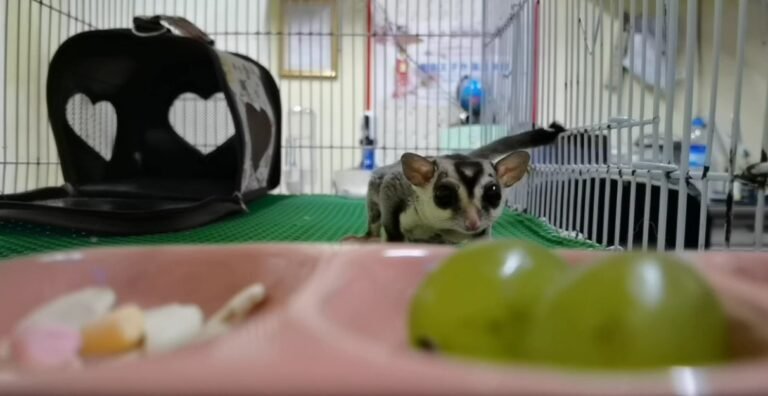Sugar Glider Not Eating Or Drinking
Sugar Glider Not Eating or Drinking: What Could Be the Problem?
If you’re a sugar glider owner, you may sometimes encounter the problem of your furry friend not eating or drinking. While it can be concerning, there are several reasons why this might be happening. In this article, we will explore the potential causes and provide helpful tips to address this issue.
Before we delve into the various reasons why a sugar glider may not be eating or drinking, it’s important to note that if you suspect your glider is unwell, it’s always best to consult with a veterinarian experienced in exotic animals. They will be able to provide you with professional advice specific to your glider’s situation.
Lack of Appetite due to Stress or Change
Sugar gliders are known to be sensitive creatures, and any sudden changes or stressful situations can impact their appetite. Here are a few common stressors that may contribute to a lack of appetite:
Environmental Changes
Sugar gliders thrive on routine and can become stressed if there are significant changes to their environment. This could include moving their cage to a different location, rearranging furniture near their enclosure, or even introducing new pets into the household.
To address this issue, try to minimize changes as much as possible and provide a comforting and consistent environment for your glider. Ensure that their cage is in a quiet and peaceful area of your home.
Introduction of New Foods
Sugar gliders can be quite selective eaters, and introducing new foods into their diet can sometimes lead to a lack of interest in their regular food. If you have recently introduced a new type of food, consider removing it temporarily and reintroducing it gradually.
It’s important to note that sugar gliders require a varied and balanced diet consisting of fresh fruits, vegetables, proteins, and specialized glider pellets. Consult with a veterinarian or a glider nutrition expert to ensure you are providing the appropriate diet for your glider’s needs.
Mating Season
During the breeding season, which typically occurs from May to November, male sugar gliders can experience a temporary decrease in appetite. This is a natural response to the hormonal changes they undergo during this period. Ensure that your glider still has access to food and plenty of water during this time.
Dental Issues to Consider

Sugar gliders have unique dental needs, and any dental issues can cause discomfort and discourage them from eating. Here are a few dental problems to be aware of:
Malocclusion
Malocclusion refers to misalignment of the teeth, which can result in difficulty chewing. This condition can be hereditary or caused by trauma. Regular dental check-ups with an exotic pet veterinarian are crucial to identify and address any dental problems.
Dental Infections
Infections in the teeth or gums can cause pain and discomfort, making it difficult for sugar gliders to eat. Look out for signs such as swollen or bleeding gums, excessive drooling, or a foul smell coming from their mouth. Dental infections require immediate veterinary attention.
Overgrown Teeth
Sugar gliders’ teeth continuously grow, and sometimes they don’t wear down properly. Overgrown teeth can lead to difficulty eating and may require regular trimmings by a veterinarian. Providing appropriate chewing toys can help prevent this issue.
Other Possible Causes
In addition to stress and dental issues, there are a few other factors that could contribute to a sugar glider’s lack of appetite:
Illness or Disease
Sugar gliders, like any other animal, can become ill or develop diseases. Infections, parasitic infestations, organ abnormalities, or metabolic disorders can all affect their appetite. If your glider shows signs of illness such as lethargy, weight loss, diarrhea, or vomiting, seek immediate veterinary care.
Age-related Changes
As sugar gliders age, their dietary needs and preferences may change. Older gliders may require a softer or more easily chewable diet. It’s important to adjust their diet accordingly and consult with a veterinarian to ensure their nutritional needs are met.
Tips for Encouraging Eating and Drinking
If your sugar glider is not eating or drinking, there are a few steps you can take to encourage them:
1. Provide a calm and comforting environment.
2. Offer a variety of fresh fruits, vegetables, and proteins.
3. Ensure their food and water sources are clean and easily accessible.
4. Introduce new foods gradually.
5. Seek veterinary advice to rule out any underlying health issues.
Frequently Asked Questions
1: How long can a sugar glider go without eating or drinking?
Sugar gliders should not go more than 24 hours without eating or drinking. If you notice that your glider is not consuming anything for an extended period, seek veterinary assistance.
2: Can dehydration be a concern for sugar gliders?
Yes, dehydration can be a serious concern for sugar gliders. It’s essential to ensure that your glider has constant access to fresh water and monitor their water intake.
Final Thoughts
Ensuring your sugar glider’s health and well-being includes monitoring their eating and drinking habits. While a temporary decrease in appetite may not be cause for alarm, prolonged lack of eating or drinking can be a sign of an underlying issue. By understanding the potential causes and seeking prompt veterinary care when necessary, you can help your sugar glider maintain a healthy and balanced diet.







